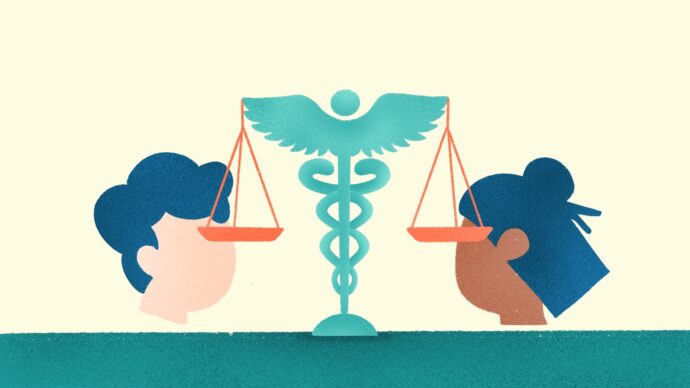
The high-risk medical profession has always posed potential legal and ethical issues, such as potential negligence. But current situations, particularly since COVID-19, have introduced new legal and ethical issues in health care. As a physician, it helps to surround yourself with a resourceful community to have the support you need as you navigate health care law and ethics.
Health care law and ethics: what you need to know
Medical ethics go back to the Greek physician Hippocrates, the father of medicine, to whom the Hippocratic oath to do no harm is attributed (circa 400 B.C.). Modern ethics set forth by The Principles of Biomedical Ethics (1985) gave us the four principles in healthcare: autonomy, justice, non-maleficence, and beneficence.
However, these principles and the Hippocratic oath are not legally binding. Ethics cannot be enforced, but laws can.
Health care law depends on individual federal and state governments. Private organizations have additional standards and policies. Furthermore, in 2005, the World Health Organization’s International Health Regulations provided an international legal framework used by Member States to define the obligations and rights of countries regarding matters of public health. These regulations are in effect for 196 countries.
What are the most significant ethical and legal issues in healthcare today?
Being on the wrong side of a medical legal battle can result in financial hardship, lost time, a tarnished professional reputation, a revoked license, and even jail. Staying up to date on the latest legal regulations and ethical standards ensures quality care to your patients and protects your practice. We surveyed our physicians to see which healthcare legal issues and ethical concerns are top of mind.
Legal issues in healthcare
According to a Sermo survey, an overwhelming 93% of physicians believe that current healthcare laws need to be revised. Though there are several potential legal issues in healthcare, three topics are currently causing concern among physicians today:
Malpractice
According to a Sermo survey, 39% of physicians think the top legal issue they face in their work is healthcare system malpractice, making it the top legal issue in health care. Malpractice caused by medical errors or negligence (in treatment or diagnosis) that causes permanent injury or death to patients leaves physicians vulnerable to lawsuits. To avoid expensive and time-consuming lawsuits, maintain the standard of care, and reach out to your peers to proactively solve problems.

Lawsuits against doctors are the order of the day, most due to negligence, incompetence or malpractice, but in many cases they are actions that are not due to the medical act as such, but due to other aspects such as existing deficits for adequate care.
Emerging telemedicine laws
20% of surveyed Sermo physicians are concerned about emerging telemedicine law, making it one of the primary legal issues in healthcare today. As telehealth rapidly rises in popularity, it can be challenging to keep up with federal regulations. It’s important to review billed claims carefully and stay updated on the latest telemedicine laws.
False claims and whistleblower suits
False claims and whistleblower suits make up the third most significant concern regarding legal aspects of healthcare. The recent increase in whistleblower lawsuits reveals the fraudulent, corrupt nature of some healthcare companies. However, the False Claims Act deters bad actors and allows anyone to file a lawsuit on behalf of the U.S. government. Physicians can reduce their risk by carefully vetting personnel, keeping up with governmental regulations, and implementing in-depth compliance training.
Ethical issues in healthcare
According to our survey, 62% of Sermo physicians believe current ethical standards in healthcare are stringent enough; 38% do not. Clearly, there are still concerns. To reduce ethical failures in their field, physicians need to concentrate on building a culture of integrity and accurately assessing patients’ needs and resources.
Balancing care quality and efficiency
Healthcare is, in essence, applied ethics. And 30% of surveyed Sermo physicians agree that balancing care quality and efficiency is the top ethical concern – especially as hospitals worldwide have been flooded with COVID-19 patients. Making sure all patients get the high quality care they deserve has put a strain on the entire healthcare system, even as providers look to deliver care in the most efficient means possible. For many physicians, navigating legal issues takes away time that could be spent treating patients.

Much lost time in trying to prevent and manage legal issues.
Informed consent
23% of surveyed Sermo physicians reported informed consent as the #2 ethical concern in healthcare. Making sure patients fully understand medical procedures before undergoing them is crucial to their health. Patients are likely worried before any procedure, so explaining their options in more than one way (verbal and written) covers your back and ensures they are given full autonomy. It is the physician’s responsibility to get informed consent in writing.
Patient confidentiality
21% of Sermo physicians are concerned about issues related to patient confidentiality, making it the #3 ethical concern in healthcare. The Health Insurance Portability and Accountability Act (HIPAA) legally prohibits disclosing medical information about patients, including making references to it on social media. Physicians should always be sure they’ve removed any identifying information before discussing patients in public venues.
Connect, converse, and solve problems on Sermo
Healthcare ethics and law are intertwined: what is illegal is largely unethical, but what is unethical is, at times, legal. It helps to talk through such issues directly with peers. Sermo’s physician networking platform makes it easy to get different perspectives on difficult situations like these. Connect, converse, and solve problems on Sermo. Stay informed, get advice, and contribute your own experiences to help other doctors. Sign up for your free Sermo account today.





